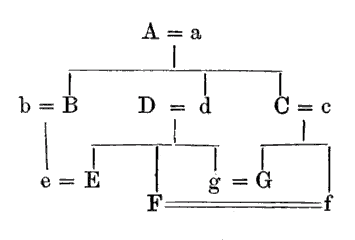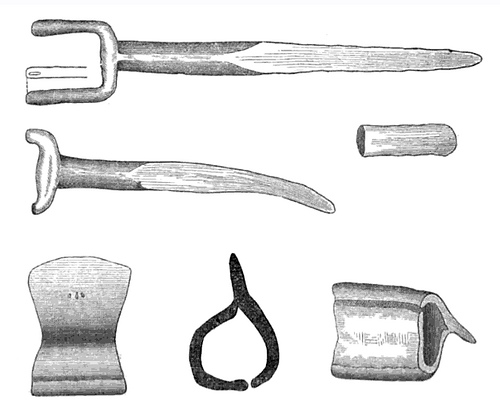
Every room in my house has an even number of doors.
Prove that the house has an even number of exterior doors.

Every room in my house has an even number of doors.
Prove that the house has an even number of exterior doors.
When I conduct a psychological experiment, my expectations might influence the outcome.
That’s called the experimenter expectancy effect. Does it exist? Well, we could do an experiment to detect it …
… but if it exists then it would bias the experiment, and if it doesn’t then we’d detect nothing. Either way, it seems, we can’t reliably assess what’s happening.

Only 23 U.S. states are entirely south of Canada’s southernmost point, Middle Island in Lake Erie.
(Please don’t try this.)
[T]ar … boils at a temperature of 220°, even higher than that of water. Mr. Davenport informs us, that he saw one of the workmen in the King’s Dockyard at Chatham immerse his naked hand in tar of that temperature. He drew up his coat sleeves, dipped in his hand and wrist, bringing out fluid tar, and pouring it off from his hand as from a ladle. The tar remained in complete contact with his skin, and he wiped it off with tow. Convinced that there was no deception in this experiment, Mr. Davenport immersed the entire length of his forefinger in the boiling cauldron, and moved it about a short time before the heat became inconvenient. Mr. Davenport ascribes this singular effect to the slowness with which the tar communicates its heat, which he conceives to arise from the abundant volatile vapour which is evolved ‘carrying off rapidly the caloric in a latent state, and intervening between the tar and the skin, so as to prevent the more rapid communication of heat.’ He conceives also, that when the hand is withdrawn, and the hot tar adhering to it, the rapidity with which this vapour is evolved from the surface exposed to the air cools it immediately. The workmen informed Mr. Davenport, that, if a person put his hand into the cauldron with his glove on, he would be dreadfully burnt, but this extraordinary result was not put to the test of observation.
– David Brewster, Letters on Natural Magic, 1868
From Lewis Carroll’s A Tangled Tale: The governor of Kgovjni gives a dinner party for his father’s brother-in-law, his brother’s father-in-law, his father-in-law’s brother, and his brother-in-law’s father — and invites a single person:

Males are denoted by capitals, females by small letters. The governor is E, and his guest is C.
See “Proof That a Man Can Be His Own Grandfather,” No Reunion, and The Half-Bastard.
One train leaves Los Angeles for New York at 60 mph.
At the same time, another train leaves New York for Los Angeles at 40 mph.
What is the distance between them one hour before they meet?
In 1998 a retired naval pilot in California began receiving semi-coherent telephone calls from around the country blaming him for torrential rain and crop failures.
“Some of them absolutely curse me out and others just ask me, in a rather grudged way, if I can just stop the rain.”
He takes the calls with good humor and has maintained his listing in the phone book.
His name is Al Nino.
unlove
v. to cease to love

Clearing out a prehistoric mica mine in Macon County, N.C., in 1880, investigators discovered a curious collection of iron tools.
The inference to be drawn from the discovery of these iron relics, is, that some of the ‘old diggings’ are the work of Europeans, as the use of iron was unknown to the native American races. Is it not possible that there is a basis of truth in the old Cherokee tradition? That a party of Spanish explorers — and perhaps more than one — penetrated Western Carolina in search of gold, silver and other minerals, and, in some instances, finding the old mines of the Mound-builders, caused preliminary investigations of their value, does not seem improbable.
“To what expedition these Europeans belonged is a mystery. That of De Soto, according to the course traced out by Bancroft, passed within a comparatively short distance of North Carolina … From it an exploring party was sent to the north, which returned disheartened, without the precious gold, reporting the mountains impassable. Could the work have been done by stragglers from this or other parties, or have there been special expeditions to this region of which the historian has lost sight?”
(Frederic W. Simonds, “The Discovery of Iron Implements in an Ancient Mine in North Carolina,” American Naturalist, January 1881)
“Contentment is natural wealth; luxury is artificial poverty.” — Socrates